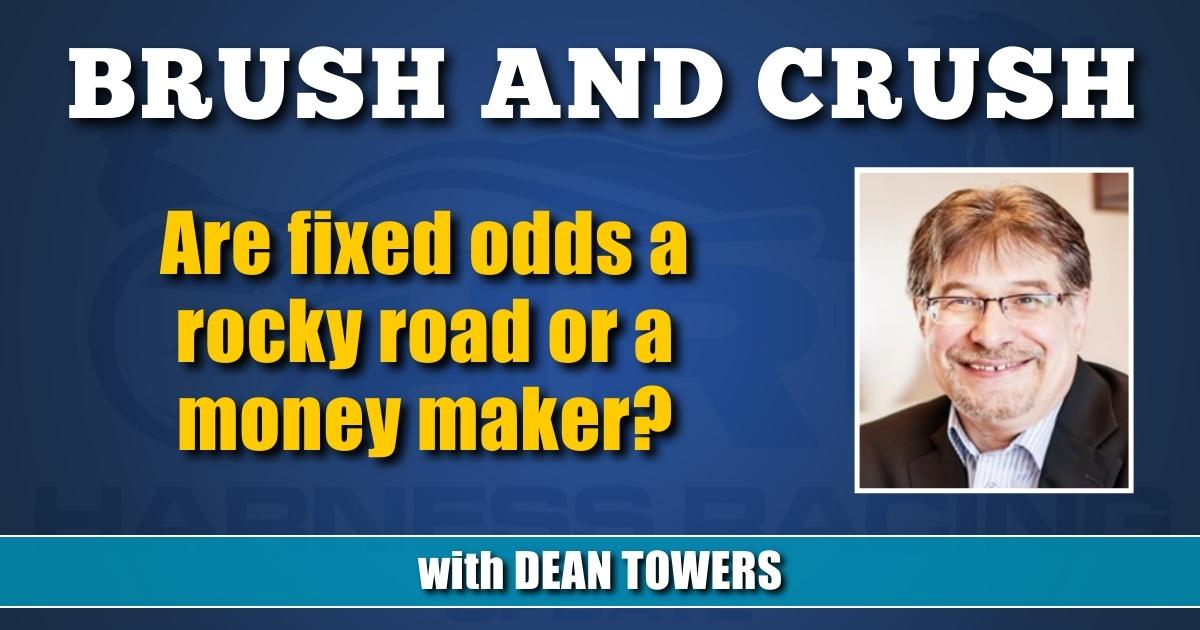Are fixed odds a rocky road or a money maker?
The press has been bullish on fixed-odds wagering, but its success or failure hinges on some important issues.
by Dean Towers
With the legalization of sports betting in the U.S. (and now much of Canada), you’ve probably heard quite a bit about fixed-odds wagering for our sport. Next month, Monmouth plans to offer its races on a new fixed odds platform, with others sure to follow, including harness racing.
At recent expositions, racing insiders in the U.S. are extremely optimistic about fixed odds, and I guess we can’t blame them. In Australia, fixed-odds wagering on horses via the TAB alone has grown from AUS$1.8B in 2010 to AUS$5.3B last year.
On this side of the pond, the gripes about late odds changes are ever-present and fixed odds address that complaint. As well, the younger demographic who grew up with -110 football games and +800 futures want to bet every sport the exact same way. This gives them a chance to patronize horse racing in a way they’re comfortable with.
So, this is all positive, right? I’m not quite sold. If we dig a little deeper, I think there are some potential issues with these rosy outlooks.
BIG FIXED-ODDS WAGERING GROWTH WOULD BE GREAT, BUT WHAT DOES IT DO TO THE POOLS?
If fixed-odds wagering does take off, what happens to the pari-mutuel “WPS” pool? As many of you know, bettors need pool size to make wagers, and as that pool size shrinks with bettors moving to fixed odds, betting into them become less attractive.
Would fixed-odds wagering simply move money from 15 per cent takeout win pools to lower takeout fixed-odds ones? If so, it’d probably not all be negative because lower takeout could turn fixed odds bettors into regular horseplayers (who bet pick 5’s and 6’s and supers), but there is a cannibalization risk. And that risk could mean purse dollars.
CAN RACING ACTUALLY LOSE MONEY?
The pari-mutuel system is a remarkable invention. Through the wisdom of crowds, the tote board has been an amazingly accurate approximation of the horses win probability over the years. It beats the best speed figures, morning line makers, and at its high takeout, most computers.
Fixed odds don’t work like that. They’re set by sharp humans and computers, but they are beatable (especially at the lower takeout they’d have to offer). The groups who do grind out break-even or better in the pari-mutuel pools are certainly going to look for edges in fixed-odds pools. And I would proffer they will win.
Unlike the pari-mutuel system where losses are subsidized by losing bettors, fixed-odds losses are paid for by the house. And in this case, the house is racing.
To combat winning bettors, sports betting firms have simply banned them, or they limit their bets. You’ve no doubt read about this on social media. That usually means negative word-of-mouth, and is not something an enterprise wants or needs.
Additionally, this added risk could prompt the tracks or books to increase takeout. But that lowers their volume and could do more harm than good, especially as racing tries to gain sports betting dollars from those who are used to 10 cent lines.
WILL THE FIEFDOMS GET IN THE WAY?
You or I can log into any sportsbook and play the Yankees at -140 or the Blues at +180. Everyone offers games and it’s seamless.
One thing horse racing’s customers have learned over the years is that signal fights and internal conflict affect them measurably, and it’s no bueno. If a racing entity wants to sign deals with sportsbook “X” but not “Y” and so on, horse racing could end up shooting itself in the foot. Customers can’t bet what’s not offered, and with so much choice for their betting dollar they aren’t going to chase four different tracks around four different books.
IS THIS SIMPLY SOMETHING THAT JUST WON’T WORK?
While most point to places like Australia for fixed-odds success, one has to take into account the customer base. Down Under, win betting has been drilled into bettors for generations, and last year only about AUS$7B of the AUS$30B wagered was in exotics pools.
In North America, it’s the opposite. We are an exotic bets Shangri-La, with decades of Pick 4 and 5 tickets flying around our TV screens and on social media. It’s what we do. Is it possible we’re a pari-mutuel continent and we won’t embrace betting win only, so this is much ado about nothing? Time will tell.
After detailing the above potential pitfalls, I would be remiss not to say that I think fixed-odds racing has potential, and I am a broad fan of the concept.
Fixed odds can provide lower takeout; attracting new customers. Having horse racing offered on DraftKings or FanDuel – especially as racing spends so much money on television – is a smart way to get in front of eyeballs. Having our major races such as the Kentucky Derby or Hambletonian offered to everyone with a sports betting account has to be a good thing.
In the end, however, its success or failure probably comes down to what I think most things come down to – planning and execution. Here’s hoping the powers that be have both figured out at launch.
















